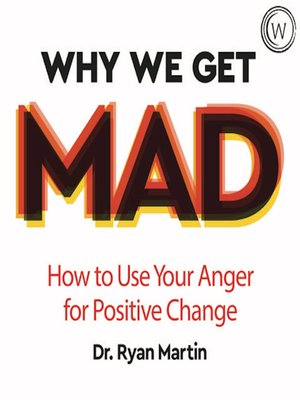Why We Get Mad
audiobook (Unabridged) ∣ How to Use Your Anger for Positive Change
By Dr. Ryan Martin

Sign up to save your library
With an OverDrive account, you can save your favorite libraries for at-a-glance information about availability. Find out more about OverDrive accounts.
Find this title in Libby, the library reading app by OverDrive.



Search for a digital library with this title
Title found at these libraries:
| Loading... |
This is THE book on anger, the first book to explain exactly why we get mad, what anger really is - and how to cope with and use it. Often confused with hostility and violence, anger is fundamentally different from these aggressive behaviours and in fact can be a healthy and powerful force in our lives.
What is anger? Who is allowed to be angry? How can we manage our anger? How can we use it? It might seem like a day doesn't go by without some troubling explosion of anger, whether we're shouting at the kids, or the TV, or the driver ahead who's slowing us down. In this book, the first of its kind, Dr. Ryan Martin draws on 20 years plus of research, as well as his own childhood experience of an angry parent, to take an all-round view on this often-challenging emotion. It explains exactly what anger is, why we get angry, how our anger hurts us as well as those around us, and how we can manage our anger and even channel it into positive change. It also explores how race and gender shape society's perceptions of who is allowed to get angry.
Dr. Martin offers questionnaires, emotion logs, control techniques and many other tools to help readers understand better what pushes their buttons and what to do with angry feelings when they arise. It shows how to differentiate good anger from bad anger, and reframe anger from being a necessarily problematic experience in our lives to being a fuel that energizes us to solve problems, release our creativity and confront injustice.
What is anger? Who is allowed to be angry? How can we manage our anger? How can we use it? It might seem like a day doesn't go by without some troubling explosion of anger, whether we're shouting at the kids, or the TV, or the driver ahead who's slowing us down. In this book, the first of its kind, Dr. Ryan Martin draws on 20 years plus of research, as well as his own childhood experience of an angry parent, to take an all-round view on this often-challenging emotion. It explains exactly what anger is, why we get angry, how our anger hurts us as well as those around us, and how we can manage our anger and even channel it into positive change. It also explores how race and gender shape society's perceptions of who is allowed to get angry.
Dr. Martin offers questionnaires, emotion logs, control techniques and many other tools to help readers understand better what pushes their buttons and what to do with angry feelings when they arise. It shows how to differentiate good anger from bad anger, and reframe anger from being a necessarily problematic experience in our lives to being a fuel that energizes us to solve problems, release our creativity and confront injustice.






